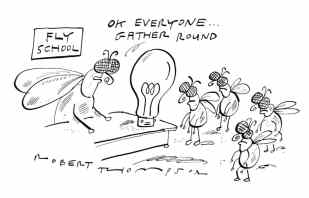What is the secret to a billionaire’s success? When Warren Buffet was asked how young people could mimic his wealth, he said: ‘Hone your communication skills, both written and verbal… You can have all the brainpower in the world, but you have to be able to transmit it, and the transmission is communication.’
Buffet knows this is easier said than done. Early in his career he’d vomit before every speech. After graduating from Columbia Business School and the New York Institute of Finance, he took a public speaking course from Dale Carnegie. ‘It changed my life,’ he says. It’s the only diploma displayed on his office wall.

Other businessmen also rank public speaking as a key driver of success. The author of Empowering Yourself, Harvey Coleman, cites ‘exposure’ as 60 per cent of the reason for his success, ‘image’ as 30 per cent and ‘performance’ a meagre 10 per cent. Research into successful public speaking supports the claim that quality of voice and non-verbal communication skills account for much more than the content of a presentation.
This is where drama plays a role. I must declare a bias – I’m a trained theatre director and I teach children drama in East Sussex, but I don’t bring this up to promote my industry. Learning performance skills – voice and diaphragm training, physicality and storytelling – boosts children’s confidence and the likelihood of achieving leadership roles later in life. Yet drama is ranked below most extracurricular subjects.
It’s often dismissed as ‘play’, something kids do at home. My four-year-old playing on the hall floor with her Frozen figurines is so engrossed in her own world that her conversations echo around the house. Yet if she and I make eye contact she plummets back into this world, looking embarrassed. It’s a shock to realise you’ve lost track of physical reality, and the fact that you have an audience. It’s a few years away for her, but the self-aware phase of adolescence looms large, a time haunted by the realisation that other people make judgements about you. Soon it will no longer be natural for her to forget I’m there. She will have to be trained in performance if she’s to maintain this skill. But that natural ability is still there – it just has to be supported, even coaxed out.
If you have an audience and you can command its attention, you hold the keys to the kingdom
I teach drama to kids aged six to 18. They all take a little encouragement, but the younger kids are raring to go within minutes of the lesson starting, pretending to be tigers as they chase each other through school chair legs. The older kids are equally keen to express themselves and to be transported by a good story but the social anxiety is ramped up, so I have to work harder to convince them to play along. Adult actors maintain this ability to play, as well as the sensitivity that goes with it. If you’ve ever been in a rehearsal room you’ll have seen men and women crawling around on the floor, fully immersed in whatever they’re pretending to be. This transition from ‘reality’ to the world of ‘play’ is as natural for them as it was when they were four. But for most of us, somewhere around the pre-pubescent years, we stop playing. We learn that it’s embarrassing to be watched, to have an audience. In truth, if you have an audience and you can command its attention, you hold the keys to the kingdom.
The modern curriculum doesn’t reflect the importance of public speaking and performance skills, and the reason may be simple: most of us are afraid to do it. A 2014 survey by Chapman University ranked the average American’s greatest fears. Four of the top five results pose a genuine threat to life and/or liberty: walking alone at night, identity theft, internet crime and mass shootings top the list. The last? Public speaking. That means most Americans worry more about giving a speech than they do about a house fire or a plane crash.
Giving a speech is fundamentally an unnatural and alarming activity, and our bodies respond accordingly. Standing in front of a silent, expectant crowd where every eye is pinned on you activates the amygdala, a primitive part of your brain which pumps adrenaline into the bloodstream and increases your heart rate. The brain reacts to an audience by preparing for fight or flight. The same happens to athletes before a big race, to actors about to go on stage, and yes, even to seasoned speakers. The difference is, these professionals are trained to perform. They can channel those nerves into their performance. That doesn’t happen naturally – it requires practice. So why are we ignoring this part of our children’s education? We all know public speaking and performing are scary and we all know they’re hugely important, so why don’t we prioritise them in the curriculum?
Yes, elementary kids memorise a poem and recite it once, and they also usually need to write a speech on a topic of choice and deliver it. I remember it – it was terrifying and there wasn’t enough practise. It also didn’t involve any teaching. I remember having to stand in front of my sixth-grade class and give a three-minute speech on Mexican cooking. We weren’t allowed more than one notecard so I crammed my entire speech in minuscule writing onto both sides of the card, then spent the whole speech trying to read my own tiny handwriting. No one taught me how to speak without reading from a prompt, which is the only way you can really engage your audience. We just expect children to be able to do this without teaching them how.






Comments